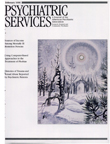Sources of income among homeless adults with major mental disorders or substance use disorders
Abstract
OBJECTIVE: The study documented sources and amounts of income among homeless adults with major mental or substance use disorders. It examined whether income varied by diagnostic group and whether those who received case management would be more likely to have income. METHODS: A total of 564 homeless adults from a countywide probability sample completed structured interviews. Based on DSM-III-R criteria, respondents were divided into four groups--those with current major mental disorders, substance use disorders, dual disorders, and no disorders. Income from entitlement benefits, formalsector employment, informal-sector employment, and other sources was documented by group. Logistic regression analysis was used to examine relationships between income sources, case management, and diagnostic groups. RESULTS: Although informal-sector income was the most common income source, it provided the fewest median dollars per month ($42). Entitlement benefits provided the most monthly income ($340) and was the second most common source. Respondents with major mental disorders, substance use disorders, or dual disorders were no less likely than those with no disorders to report income from entitlement benefits or formal-sector employment. Among those with major mental disorders, substance use disorders, or dual disorders, respondents who had recent case management were four to nine times more likely to report entitlement income. CONCLUSIONS: The results support other research and anecdotal findings on the importance of case management in obtaining entitlement income among homeless adults with major mental or substance use disorders.
Access content
To read the fulltext, please use one of the options below to sign in or purchase access.- Personal login
- Institutional Login
- Sign in via OpenAthens
- Register for access
-
Please login/register if you wish to pair your device and check access availability.
Not a subscriber?
PsychiatryOnline subscription options offer access to the DSM-5 library, books, journals, CME, and patient resources. This all-in-one virtual library provides psychiatrists and mental health professionals with key resources for diagnosis, treatment, research, and professional development.
Need more help? PsychiatryOnline Customer Service may be reached by emailing [email protected] or by calling 800-368-5777 (in the U.S.) or 703-907-7322 (outside the U.S.).



